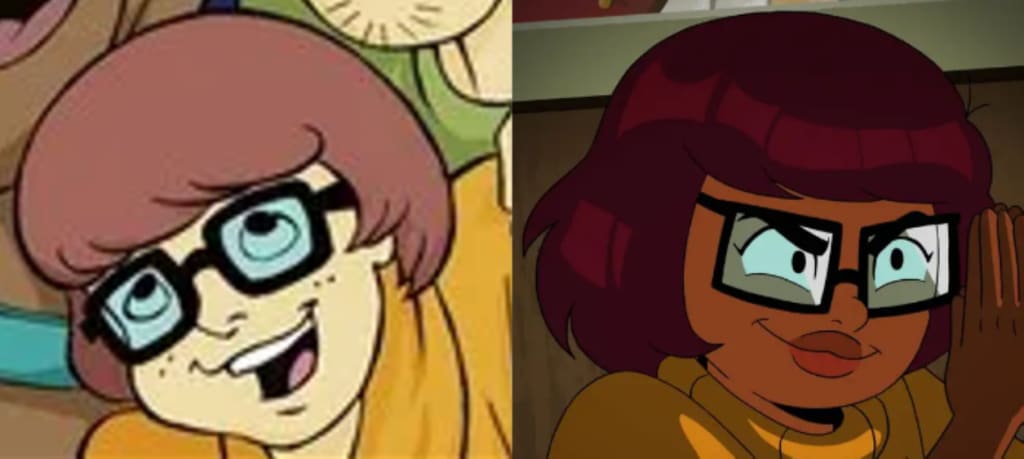
So the new Velma series is out on HBO Max, and after a lukewarm-to-scathing reception to preview materials so bad that HBO's Official YouTube had to shut down comments for a time, the full series is even worse than everyone expected. Anybody who knows me knows that I like to find the good in any media, that I believe that there is worth in even the "worst" stories, but Velma is one of the few times where I doubt my own philosophy. Watching the first few episodes felt like a punishment instead of entertainment, and if I'm ever lucky enough to teach my own writing class in the future, I would assign Velma as an example of how not to tell a good story.
Now, I could spend this whole article ranting about why Velma is so bad. I could talk about the vapid dialogue that thinks it's clever when it's actually cringe-inducing. I could talk about the gratuitous shock and political humor that's more painful than funny. I could talk about how every character is a hateable dick with little redeeming qualities. I could talk about how it turns the lovable Mystery Inc. cast into a self-entitled brat, a manipulative Alpha Bitch, a friendly if simpy guy that everyone kicks down for no reason, and a rich bigoted manchild (with no talking dog to add any levity either). I could talk about how it shamelessly mocks both its target audience and fans of the Scooby franchise and feels more like a shallow insult than a playful parody. But I'm not going to do that. Everyone and their mother has already done that for me.
Instead, I want to focus on the Scooby-Doo series that I cleansed my palate with after Velma only soured my mood. This was the incarnation of the series that I watched the most as a kid, and to this day it remains my personal favorite. It puts refreshing twists on the classic style of mysteries that Where Are You! established in the late 60s while playfully poking at its own clichés. It modernizes the cast for a 21st century audience without sacrificing their core characteristics. While not perfect, it stays true to the franchise's campy spirit in a way that no other incarnation has. It is an unsung classic in the franchise's long history, and I consider it one of if not the most underrated Scooby series out there.
And no, I'm not talking about Mystery Incorporated.
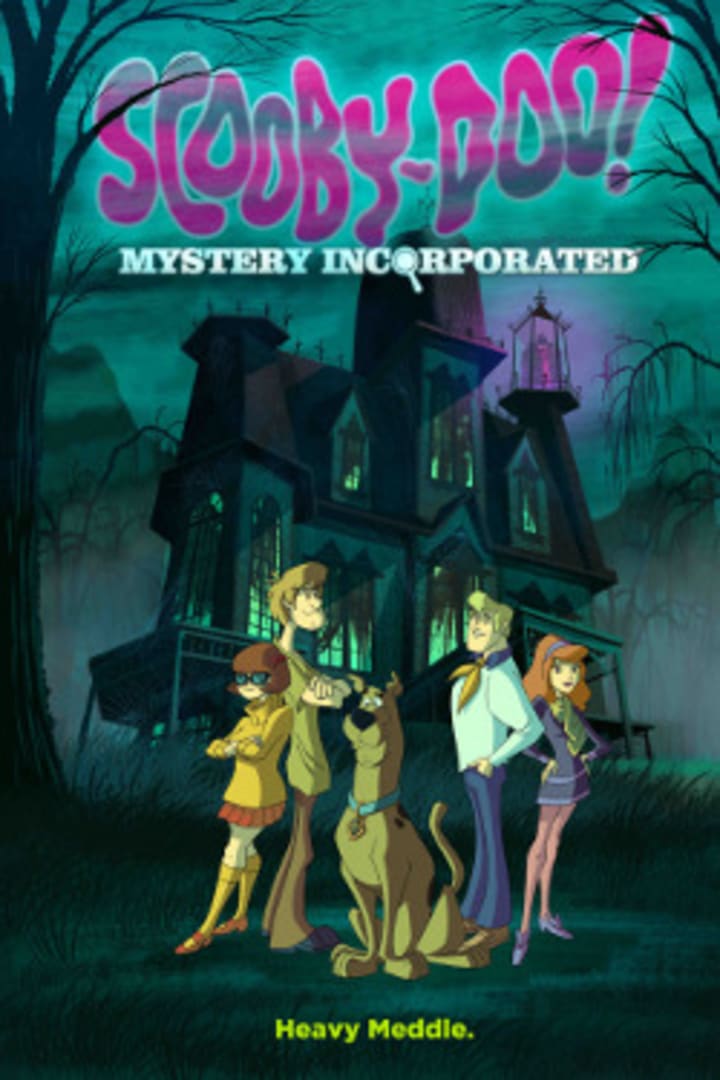
Now, Mystery Incorporated is far far from a bad incarnation of the show. It is still a fascinating take on classic Scooby-Doo stories that understands the franchise while still updating it for modern audiences. It blends the series' classic charm with a darker tone, higher stakes, and greater attention put on the gang's relationships. It is extremely admirable for its season-long story arcs and deeper character development for the gang, a first for any iteration of the TV series at its time of release. I especially admire its expansions on the Scooby universe's lore and settings without losing sight of what made the original characters so memorable.
However, I can also see where the series might not be to everyone's taste. While I do enjoy its commitment to a deeper story and greater emphasis on character - two things that I always believe make a story more memorable - some of those elements can still come across as out of place for the cast. Maybe this is just a personal thing, but I got tired of the ongoing relationship drama really fast. While it isn't unrealistic to how actual teenagers act, it still felt off-putting watching a group as typically tight-knit as Mystery Inc. fall apart because of romantic tension (like, don't even get me started on Velma's ridiculous jealousy of her boyfriend's dog). Not to mention, while I am far from against inserting actually supernatural or sci-fi elements into Scooby stories - I mean, there is a reason why people still adore Zombie Island, Witch's Ghost, and Cyberchase - especially in the second season I can see many viewers clocking out because of how outlandish the plots become. It's weird to hear me of all people say that there was too much character development, but sometimes the drama overshadows what I liked about the characters in the first place, which is why I don't personally find myself revisiting Mystery Incorporated as much as others do.
(Plus, everyone else has already explained to death why the show is good, so I wouldn't have anything new to add to the discussion anyway.)
But say I want to watch something a bit closer in tone and style to Where Are You! instead. Say I'd prefer a series that emulates the franchise's cartoony roots while also updating the mysteries to keep the format from growing stale. What if I wanted something that plays with that format in humorous ways and adds new depth to the cast without adding unnecessary drama? A series that, while clearly targeted for a younger audience, is still a charming and fun piece of the franchise's history to revisit?
That's where What's New Scooby Doo? comes in.
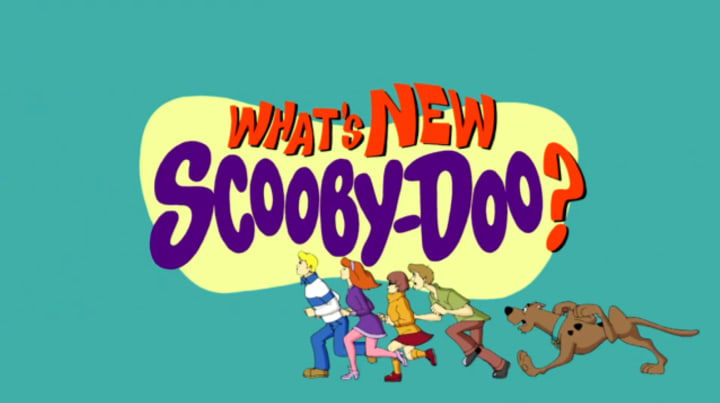
What's New is the ninth iteration of the iconic series and was the first to pop up in ten years since A Pup Named Scooby-Doo ended in 1991. The first season aired in 2002 and two more seasons followed with fourteen episodes each. Its cast was very notable as it marked the first time Frank Welker voiced Scooby alongside Fred, whom he'd played since Where Are You! aired; the first time Grey DeLisle and Mindy Cohn joined to play Daphne and Velma respectively; and the last time legendary voice actor Casey Kasem would voice Shaggy before his passing in 2014.
Like I've said before, the series is a modernized take on the episodic format that Where Are You! established; each entry is a self-contained story where the teenage gang stumble upon a mystery to solve while vacationing or visiting relatives, usually involving a monster that chases them in a goofy montage set to then-popular music, before the ending revelation that the monster was, as always, a cover-up to the real villain's plot.
What set What's New apart from Where Are You! was how it incorporated early-to-mid 2000's technology and culture into its stories. However, the writers had the forethought not to let this "modern" tone overshadow the series' core style and the characters' key personalities. Instead, the characters are just as recognizable as they were in the 60s with some much-needed updates to keep them from becoming one-note copies of their original selves. Fred is still the friendly and headstrong leader of the group, however now he often stumbles with his one-track mind and social awkwardness; Daphne is still the danger-prone fashionista who sometimes acts as damsel-bait, but this time she is far more resourceful and has an eye for details that the others might miss; Velma is still the biggest brains of the gang, though now with a touch of snark and sometimes overconfidence that can leave her frustrated when her predictions are inaccurate; finally, Shaggy and Scooby are still dorky food-loving cowards, but now they're significantly more intuitive than they might seem at first.
Despite any flaws they may have though, every episode establishes how close the friends are and how far they will go to protect each other in dire circumstances. It may just be personal preference, but this is the version of Mystery Inc. that I enjoy the most; though they may sometimes get on each others' nerves, deep down they have an unbreakable bond and see each other as family.
Now, a return to the episodic and predictable structure may sound boring at first, but what I appreciate about What's New is that it uses its modernization to flip the mysteries' clichés on their heads and refresh them for its current audience. The premiere episode, "There's No Creature Like Snow Creature", establishes this right away when the gang first encounters the Monster of the Week:
While it may not have the same impact today, it legitimately floored me as a kid seeing this: a Scooby-Doo monster, in a single shot, so visibly deconfirmed as just a man in a mask. I wondered how the monster could still be fake when there weren't any visible strings attached to it, and which character could be the real culprit if they weren't present alongside the creature. It immediately contrasts the expectations of the audience who remembered Where Are You!'s stories; it tells them right away that this isn't the era of rubber masks anymore, that these villains are far craftier than the viewer remembered. It doesn't defy expectations as viscerally as Zombie Island did with its actually supernatural antagonists, but it still signals fresh twists on the classic formula that the audience likely wouldn't have predicted.
This clip also does a great job establishing the series' blend of lighthearted comedy with legitimate threat. The gang's arrival to the snowboarding competition and introduction to involved characters is full of cartoony charm and goofiness, but once the monster arrives the jokes stop. Then, when Fred lures the monster away and injures his leg in the process, it establishes that these monsters will hurt them to keep their plot a secret, and their threat should be taken seriously. Again, the threats are not nearly as serious as in Zombie Island or Witch's Ghost, but they add realistic stakes that keep the episodes interesting even if the audience already knows how the conclusion will play out.
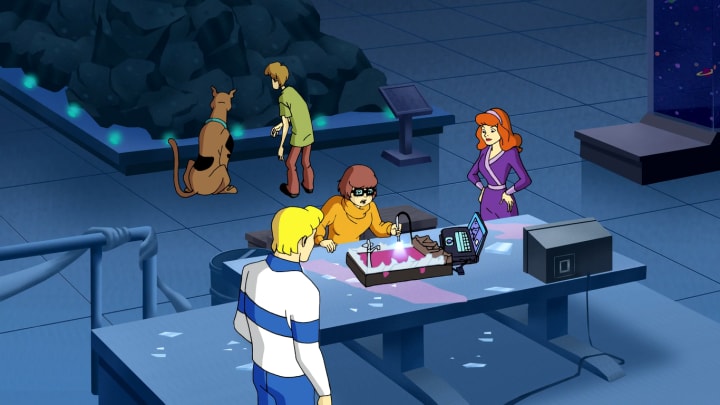
The most notable contrast from past versions is of course the 21st century setting. The gang are surrounded by culture and technology that was barely a thought in 1969, including cell phones, computers, video cameras, digital imaging, artificial intelligence, and virtual reality. Unlike other attempts to modernize classic IPs though, in What's New the technology isn't intrusive or conspicuous to the stories the show wants to tell. Rather, the technology is woven into the mysteries themselves and tends to play a key part in creating the weekly monster.
The gang aren't out-of-place against the modern backdrop either. The show makes it clear that this version of the cast have lived in the 21st century most of their lives, and thus they know how to react to it while staying in-character. The showrunners also did a brilliant job making sure the gang fit into the 2000s cultural backdrop as well, as they updated their 60s outfits into fashion much closer to what young adults would wear at the time while keeping the core characters recognizable.
In an age where way too many classic properties are modernized poorly, where the modern elements clash with the old cast or the characters become so modernized that they barely resemble their originals, I always appreciate the rare attempts that work. What's New is such a perfect example of how to nail it with Scooby-Doo that it leaves me confused why the writing teams at Warner Bros. didn't take any notes from it for Scoob! or Velma.
Likewise, I'm surprised that recent iterations haven't followed What's New's example on how to do self-referential humor.
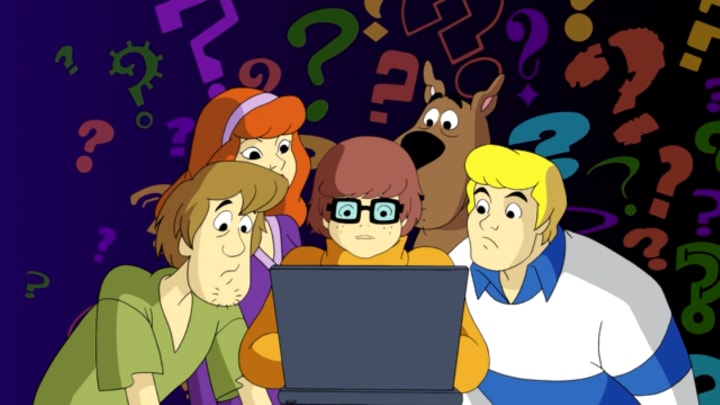
I know that I'm far from the only person who's grown tired of the current oversaturation of self-awareness in storytelling. At first it's fun hearing fictional characters call out their own clichés, but in the last decade it has unfortunately become yet another popular trend meant to draw in ratings or views rather than create effective comedy. Just like jumpscares in horror cinema, self-awareness has become an easy marketing tool that feels cheap if done too much with little variation. Self-awareness in small and creative doses is fine, but when characters are constantly referencing their own tropes or archetypes - such as in the aforementioned Velma - it shatters audience immersion and makes it harder for them to connect with the story.
What's New Scooby-Doo? is also a fan of poking at its own tropes, but just like the 2000s setting, what makes it work here is how unobtrusive it's played. The characters often bring up their usual splitting-up-for-clues dynamic, indulge in their reputations as "meddling kids", or just point out the fact that out-there mysteries seem to follow them everywhere, but just like the modern technology, these references are woven organically into the dialogue. They're always in-character, and the jokes don't overstay their welcome. The cast never say outright that they know they're in a cartoon, but they have been having adventures like these for a long time and this self-awareness references that without taking the viewer out of the watching experience.
Even when the show indulges on the self-references, it's still fun to watch because it's either integral to the story or locked to the show's universe. The episode "A Terrifying Round with a Menacing Metallic Clown" does both of these to great effect to create some of the most ridiculous yet hilarious moments in the entire show:
For a single episode, Shaggy and Velma swap their roles around; Shaggy takes charge in solving the mystery for once because the weekly monster is threatening his Mini-Golf Championship game, while Velma's intense fear of clowns caused by a traumatic childhood incident makes her avoid the mystery at all costs. They even swap catchphrases for a time. It's just as absurd and hilarious as it sounds. Daphne, Fred, and Scooby's baffled reactions to the swaps only add to the comedy because they most likely mirror the audience's reactions as well. It's a brilliant way to parody the show's own archetypes while also having fun with them.
Not every moment of self-parody is as ridiculous as this, but I believe it captures the show's tone perfectly; What's New aims to have fun with these characters, play around with them and sometimes poke fun at their clichés, but it never mocks them. It isn't afraid to make fun of itself, but it does so in a way that respects the characters and pays tribute to the Scoobys that came before it. It's self-awareness that celebrates the franchise instead of insulting it.
This is the main reason why I recommend What's New so much, especially after experiencing Velma; it parodies itself, but through that parody it asks the audience to laugh with the characters and enjoy their adventures alongside them. It's self-awareness that feels like an inside joke, a joke that makes you laugh because of how well you know this beloved cast and the forms their adventures take. It's the kind of self-aware humor that I love and want to see more stories explore.
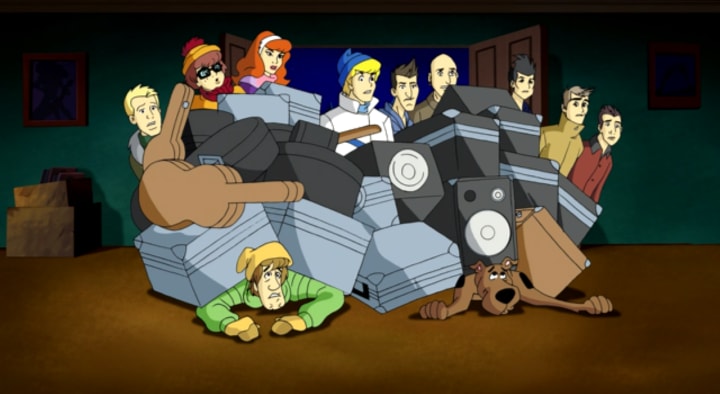
Of course, none of this is to say that What's New is perfect. Not every episode is memorable and some of the monsters feel more basic than others (for example, I barely recalled the zombie gladiator from "Pompeii and Circumstance" until I reviewed it for this article). Unfortunately, because it is so deeply rooted in 2000s culture, the show will also feel very dated to a 2020s audience (I mean, when was the last time somebody of Shaggy's age would have to burn music to a CD? or use their cellphones for only phone calls?). But I would argue that this is part of the show's charm. Maybe it's just because I grew up in this era, but I have strong nostalgia for the 2000s and again, in What's New's context, the 2000s setting feels right at home for the stories the episodes tell.
Likewise, while the show's music choices were most popular in the early 2000s compared to now, they are still a jam to this day. Once per episode a cartoony chase sequence ensues set to then-popular music, which makes the formulaic scenes really fun to watch (and definitely informed my music taste growing up). From pop- and punk-rock like The Atomic Fireballs and The Ramones to overseas artists like Puffy AmiYumi and Mikro, there is a diverse array of music throughout the show that fit each episode's setting or mood.
But I can't talk about the music without bringing up Simple Plan's incredible opening theme song:
The energy in this song is perfect for What's New. It begins high and doesn't let up even on the final note. It is, for me, the best kind of theme song because it pumps up the viewer and fills them with excitement for the actual show.
Overall, I would argue that What's New Scooby-Doo? is even more underrated than Mystery Incorporated. I rarely see it discussed as much as other iterations, and with Velma currently making the fanbase look back at every Scooby that did it better, I wanted to give my personal favorite some much-deserved love. It's funny, it's charming, and feels like a slice of childhood. It tells intelligent stories while showing a good sense of humor about its roots. And, best of all, it never forgets its heart: the fun dynamics between our four meddling kids and their goofy Great Dane - just as any Scooby series should.
____________________________________________________
Please support the official release. What's New Scooby-Doo? is now available to stream on HBO Max.
If you enjoy my work and want to support me further, please consider leaving a like or a tip and sharing this story on social media! Thanks so much!
About the Creator
Em E. Lee
Writer-of-all-trades and self-appointed "professional" nerd with an infinite supply of story ideas and not nearly enough time to write them down. Lover of all media, especially fiction and literature. Proud advocate of the short story.






Comments
There are no comments for this story
Be the first to respond and start the conversation.